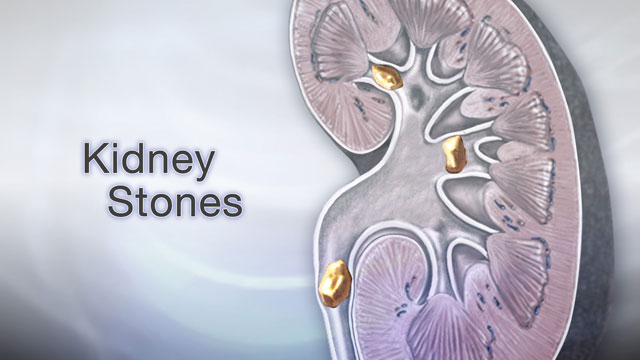Kidney stones - what to ask your doctor
Nephrolithiasis - what to ask your doctor; Renal calculi - what to ask your doctor; What to ask your doctor about kidney stones
A kidney stone is a solid piece of material that forms in your kidney. The kidney stone may get stuck in your ureter (the tube that carries urine from your kidneys to your bladder). It also may get stuck in your bladder or urethra (the tube that carries urine from your bladder to outside your body). A stone can block the flow of your urine and cause great pain. In most cases, a stone that is in the kidney and not blocking the flow of urine does not cause pain.
Below are some questions you may want to ask your health care provider.

Questions
If I had a kidney stone removed, can I get another one?
How much water and liquids should I drink every day? How do I know if I'm drinking enough? Is it OK to drink coffee, tea, or soft drinks?
What foods can I eat? What foods should I avoid?
- What types of protein can I eat?
- Can I have salt and other spices?
- Are fried foods or fatty foods OK?
- What vegetables and fruits should I eat?
- How much milk, eggs, cheese, and other dairy foods can I have?
Is it OK to take extra vitamins or minerals? How about herbal remedies?
What are the signs that I may have an infection?
Could I have a kidney stone and not have any symptoms?
Can I take medicines to keep kidney stones from coming back?
What surgeries or other procedures can be done to treat my kidney stones?
What tests can be done to find out why I get kidney stones?
When should I call the provider?
References
Bushinsky DA. Nephrolithiasis. In: Goldman L, Schafer AI, eds. Goldman-Cecil Medicine. 26th ed. Philadelphia, PA: Elsevier; 2020:chap 117.
Leavitt DA, de la Rosette JJMCH, Hoenig DM. Strategies for nonmedical management of upper urinary tract calculi. In: Partin AW, Dmochowski RR, Kavoussi LR, Peters CA, eds. Campbell-Walsh-Wein Urology. 12th ed. Philadelphia, PA: Elsevier; 2021:chap 93.
Review Date: 1/1/2023


